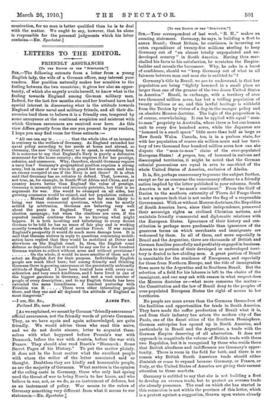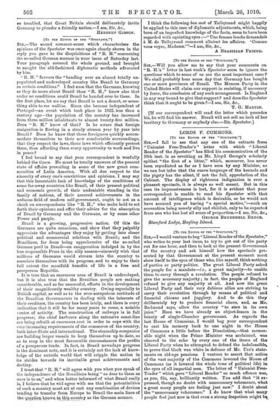[TO THR EDITOR OP THE " SPECTATOR:1
Si,—Your correspondent of last week, "R. H.," makes an amazing statement. Germany, he says, is building a fleet to annex Brazil ; Great Britain, he continues, is incurring an extra expenditure of twenty-five millions sterling to keep Germany out of "an almost totally unpopulated and un- developed country" in South America. Having thus mar- shalled his facts to his satisfaction, he scratches the Empire- builder and reveals the buccaneer. Why, he asks in a burst of confidence, should we "keep Germany out of what in all fairness between man and man she is entitled to" P Germany's title to Brazil, we are to understand, is that her population are being "tightly hemmed in a small place no larger than one of the greater of the two dozen United States in America." Brazil, in exchange, with a territory of over two thousand million acres, has but a trifling population of twenty millions or so, and this lawful heritage is withheld from the Teuton by virtue of a dog-in-the-manger policy and an obsolete Monroe doctrine. The logic of the proposition is, of course, overwhelming. It can be applied with equal " man- to-man " propriety to Australia, where there is but one human unit to every five hundred acres, while the Japanese are "hemmed in a small apace" little more than half as large as New South Wales. Canada, too, is in a parlous state, for with her population of scarce six million souls and her terri- tory of two thousand four hundred million acres how can she dispute the " man-to-man " claim of the over-populated European States ! A propos, too, of hemmed-in nations and disoccupied territories, it might be noted that the German colonial possessions are equal in area to one-third of the whole United States of America, exclusive of Alaska.
It is, Sir, perhaps unnecessary to pursue the subject further, except so far as concerns the unnecessary offence to a friendly nation implied by the letter published in your columns. South America is not a "no-man's continent." From the Gulf of Darien to the southern extremity of Tierra del Fuego there is not a square inch that is not under the flag of a responsible Government. With or without Monroe doctrines, the Republics of South America have, since their independence, preserved their sovereign rights as civilised Christian nations, and maintain friendly commercial and diplomatic relations with the European States. Ignorance of their history and con- stitution is perhaps more pardonable than ignorance of the generous terms on which merchants and immigrants are welcomed by them. In all of them, and more especially in Brazil and the Argentine, there are thousands of British and German families peacefully and profitably engaged in business. Access to no portion of their developed or undeveloped terri- tory is denied to law-abiding men. A great portion of Brazil is unsuitable for the residence of Europeans, and especially for those from Northern Europe, and the tide of immigration flows more to the Argentine and to Southern Brazil. But the selection of a field for Ms labours is left to the choice of the immigrant, and one may ask with reason in what respect does the Monroe doctrine or—what more concerns the matter— the Constitution and the law of Brazil deny to the peoples of over-populated European States the right of access to her territories.
No people are more aware than the Germans themselves of the facilities and opportunities for trade in South America. They have made the coffee production of Brazil what it is, and from their industry has arisen the modern city of Sao Paolo, one of the finest cities of the Southern Hemisphere. German enterprise has opened up in South America, and particularly in Brazil and the Argentine, a trade with the German Empire deserving of all admiration. It does not approach in magnitude the volume of British trade with these two Republics, but it is recognised by those who reside there that British aloofness and indifference are Germany's oppor- tunity. There is room in the field for both, and there is no reason why British South American trade should either diminish or cease to expand because Germany, or France, or Italy, or the United States of America are giving their earnest attention to these markets.
Germany is entitled to say that she is not building a fleet to develop an oversea trade, but to protect an oversea trade she already possesses. The road on which she has started in this connexion is not within the province of this letter, which is a protest against a suggestion, thrown upon waters already so troubled, that Great Britain should deliberately invite Germany to plunder a friendly nation.—I am, Sir, &c.,
HERBERT GIBSON.







































 Previous page
Previous page